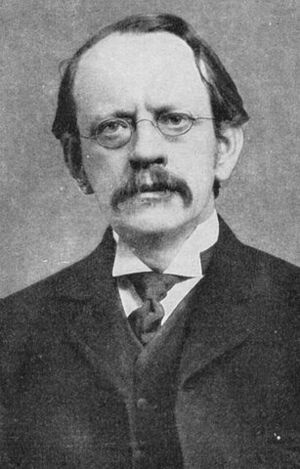J. J. Thomson (nonfiction): Difference between revisions
(Created page with "thumb|Joseph John Thomson.'''Sir Joseph John Thomson''' OM PRS (18 December 1856 – 30 August 1940) was an English physicist and Nobel Laureate in Ph...") |
No edit summary |
||
| Line 4: | Line 4: | ||
Thomson was awarded the 1906 Nobel Prize in Physics for his work on the conduction of electricity in gases. | Thomson was awarded the 1906 Nobel Prize in Physics for his work on the conduction of electricity in gases. | ||
== In the News == | |||
<gallery> | |||
</gallery> | |||
== Fiction cross-reference == | |||
* [[Crimes against physical constants]] | |||
* [[Gnomon algorithm]] | |||
* [[Gnomon Chronicles]] | |||
== Nonfiction cross-reference == | |||
* [[Physics (nonfiction)]] | |||
External links: | |||
* [https://en.wikipedia.org/wiki/J._J._Thomson J. J. Thomson] @ Wikipedia | |||
Attribution: | |||
[[Category:Nonfiction (nonfiction)]] | |||
[[Category:People (nonfiction)]] | |||
[[Category:Photographs (nonfiction)]] | |||
[[Category:Physicists (nonfiction)]] | |||
[[Category:Portraits (nonfiction)]] | |||
[[Category:Scientists (nonfiction)]] | |||
Revision as of 21:39, 29 April 2018
Sir Joseph John Thomson OM PRS (18 December 1856 – 30 August 1940) was an English physicist and Nobel Laureate in Physics, credited with the discovery and identification of the electron; and with the discovery of the first subatomic particle.
In 1897, Thomson showed that cathode rays were composed of previously unknown negatively charged particles, which he calculated must have bodies much smaller than atoms and a very large value for their charge-to-mass ratio. Thomson is also credited with finding the first evidence for isotopes of a stable (non-radioactive) element in 1913, as part of his exploration into the composition of canal rays (positive ions). His experiments to determine the nature of positively charged particles, with Francis William Aston, were the first use of mass spectrometry and led to the development of the mass spectrograph.
Thomson was awarded the 1906 Nobel Prize in Physics for his work on the conduction of electricity in gases.
In the News
Fiction cross-reference
Nonfiction cross-reference
External links:
- J. J. Thomson @ Wikipedia
Attribution:
